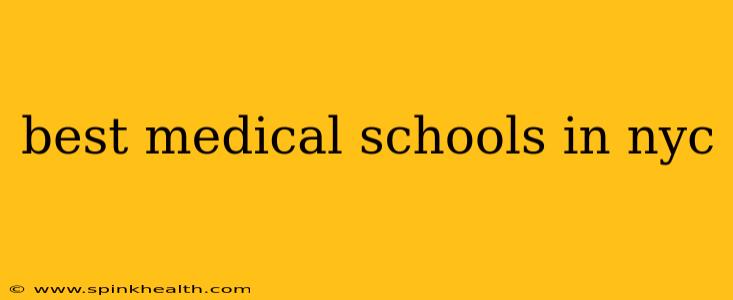Navigating the Maze: Unveiling the Best Medical Schools in NYC
The bustling streets of New York City, a global hub of innovation and excellence, are also home to some of the most prestigious medical schools in the world. Aspiring physicians often dream of studying in this dynamic environment, but the sheer number of options can be overwhelming. This isn't just about picking a school; it's about choosing a launchpad for a lifelong career dedicated to healing and research. So, let's unravel the complexities and explore the leading contenders for the title of "best" medical school in NYC. It's a subjective title, of course, depending on individual priorities and career goals, but we can highlight what makes each institution unique.
My journey into this topic began years ago when I was helping a friend navigate the medical school application process. The sheer volume of information, the varying strengths of different programs, and the intense pressure to choose wisely—it was daunting. This experience fueled my passion to demystify the process and help future physicians make informed decisions.
Which Medical Schools are in NYC?
New York City boasts a rich landscape of medical education, but some stand out consistently for their research prowess, clinical opportunities, and overall reputation. These include:
- Columbia University Vagelos College of Physicians and Surgeons (VP&S): A titan in medical education, renowned for its rigorous curriculum and cutting-edge research.
- Icahn School of Medicine at Mount Sinai: Known for its strong clinical training and diverse patient population, offering invaluable hands-on experience.
- New York University Grossman School of Medicine (NYU Grossman): A powerhouse in urban medicine, deeply embedded in the vibrant clinical settings of NYC.
- Albert Einstein College of Medicine: A leading institution emphasizing both research and clinical practice, often lauded for its commitment to community health.
What Makes a Medical School "Best"?
Before diving into individual school profiles, it's crucial to define what constitutes the "best" medical school. It’s a multifaceted question with no single answer. Factors to consider include:
- Research Opportunities: The availability of cutting-edge research labs and mentorship opportunities significantly influences the trajectory of a medical career.
- Clinical Rotations: Exposure to a diverse range of patient populations and clinical settings is invaluable for practical training.
- Faculty: The caliber of the faculty—their expertise, mentorship style, and research contributions—shapes the learning experience.
- Location and Resources: NYC offers unparalleled access to world-class hospitals and research facilities, but the sheer size and competitiveness can also present challenges.
- Student Support: A supportive learning environment, including mentorship programs and career counseling, is crucial for success.
How Difficult is it to Get into Medical School in NYC?
The highly competitive nature of medical school admissions in NYC is well-known. Acceptance rates are notoriously low, reflecting the rigorous application process and the high caliber of applicants. Factors like MCAT scores, GPA, research experience, clinical experience, and letters of recommendation all play crucial roles in the admission decision. Preparation, perseverance, and a genuine passion for medicine are essential ingredients for success.
What is the Cost of Attending Medical School in NYC?
The cost of medical education in NYC, like in most major cities, is substantial. Tuition fees, living expenses, and other related costs can accumulate significantly. Prospective students should carefully research financial aid options, scholarships, and loan programs to plan effectively.
How Long Does it Take to Become a Doctor in NYC?
The path to becoming a doctor in NYC, as elsewhere, typically involves four years of medical school followed by a residency program, which can last from three to seven years depending on the chosen specialty.
A Deeper Dive into NYC's Top Medical Schools
Each of the schools mentioned above possesses unique strengths and attracts students with diverse interests and career goals. Further research into each institution's specific programs, faculty, and research initiatives is highly recommended. Visiting campuses, attending information sessions, and speaking with current students can provide invaluable insights into the culture and learning environment of each school.
This exploration offers a starting point in the journey of choosing the right medical school in NYC. Remember, the "best" medical school is the one that best aligns with your individual aspirations, learning style, and career goals. By carefully considering these factors and undertaking thorough research, you can embark on your medical education journey with confidence and purpose.

